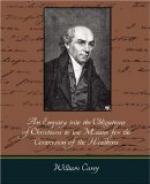[Footnote 2: The account of this second journey into the heathen world begins at Acts xv. 40. and ends chap. xviii. 22.]
[Footnote 3: See ch. xviii. 23. and Gal i. 2.]
From Philippi they passed thorough Amphipolis, Apollonia, Thessalonica, (now Salonichi,) Berea, Athens, and Corinth, preaching the gospel wherever they went. From hence Paul took ship and sailed to Syria, only giving a short call at Ephesus, determining to be at Jerusalem at the feast of the passover; and having saluted the church, he came to Cesarea, and from thence to Antioch.
Here ended Paul’s second journey, which was very extensive, and took up some years of his time. He and his companions met with their difficulties in it, but had likewise their encouragements. They were persecuted at Philippi, as already noticed, and generally found the Jews to be their most inveterate enemies. These would raise tumults, inflame the minds of the gentiles against them, and follow them from place to place, doing them all the mischief in their power. This was the case especially at Thessalonica, Berea, and Corinth. But amidst all their persecutions God was with them, and strengthened them in various ways. At Berea they were candidly received, and their doctrine fairly tried by the Holy Scriptures; and therefore, it is said, many of them believed. At other places, though they affected to despise the apostle, yet some clave unto him. At Corinth opposition rose to a great height; but the Lord appeared to his servant in a vision, saying, Be not afraid, but speak, and hold not thy peace, for I am with thee, and no man shall set on thee to hurt thee; for I have much people in this city. And the promise was abundantly made good in the spirit discovered by Gallio, the proconsul, who turned a deaf ear to the accusations of the jews, and nobly declined interfering in matters beside his province. Upon the whole a number of churches were planted during this journey, which for ages after shone as lights in the world.




